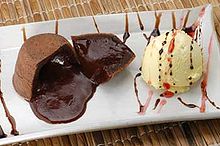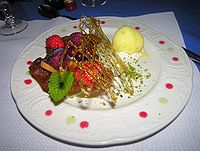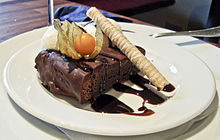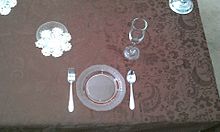- Dessert
-
Part of a series on Meals 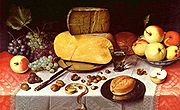
Common meals Breakfast · Brunch · Lunch · Tea · Dinner · Supper Components & courses Amuse-bouche · Appetizer · Cheese · Cocktails · Dessert · Drink · Entrée · Entremet · Fruit · Main course · Nuts · Salad · Side dish Related concepts Banquet · Buffet · Cuisine · Eating · Etiquette · Food · Global cuisines · Outline of cuisines · Snack In cultures around the world, dessert is a course that typically comes at the end of a meal, usually consisting of sweet food. The word comes from the French language as dessert and this from Old French desservir, "to clear the table" and "to serve." Common Western desserts include cakes, biscuits, gelatin, pastries, ice cream, pies, and candies. Fruit may also be eaten with or as a dessert.
Variations of desserts can be found all around the world, such as in Russia, where breakfast foods such as bliny, oladi, and syrniki served with honey and jam are also popular as desserts. Desserts are sometimes eaten with a dessert spoon, intermediate in size between a teaspoon and a tablespoon.
Contents
History
The first desserts were crusty, made from raw honeycomb and dried dates. It was not until the Middle Ages, when sugar was manufactured, that people began to enjoy more sweets but even then sugar was so expensive that it was only for the wealthy on special ocasions. Early origins of popular frozen desserts, such as ice cream, trace back to the Middle Ages when royalty would request fresh ice flavored with honey or a fruit syrup.[1]
Etymology
The word dessert is most commonly used for this course in U.S., Canada, Australia, New Zealand and Ireland, while sweet, pudding or afters may be alternative terms used in the UK and some other Commonwealth countries, including India. In England, the term pudding is usually used among the Upper and Upper-middle classes, with dessert only used if the course consists of fruit or sweetmeats, after the cheese and biscuits course (See U and non-U English).
Nutrition
Those attempting to lose weight as part of a dieting program may choose to restrict their intake of dessert foods, as they tend to have a large amount of calories, fat and sugar.
References
- ^ "History of Desserts." Gourmet.lovetoknow.com. Accessed August 2011.
External links
Categories:- Desserts
Wikimedia Foundation. 2010.

